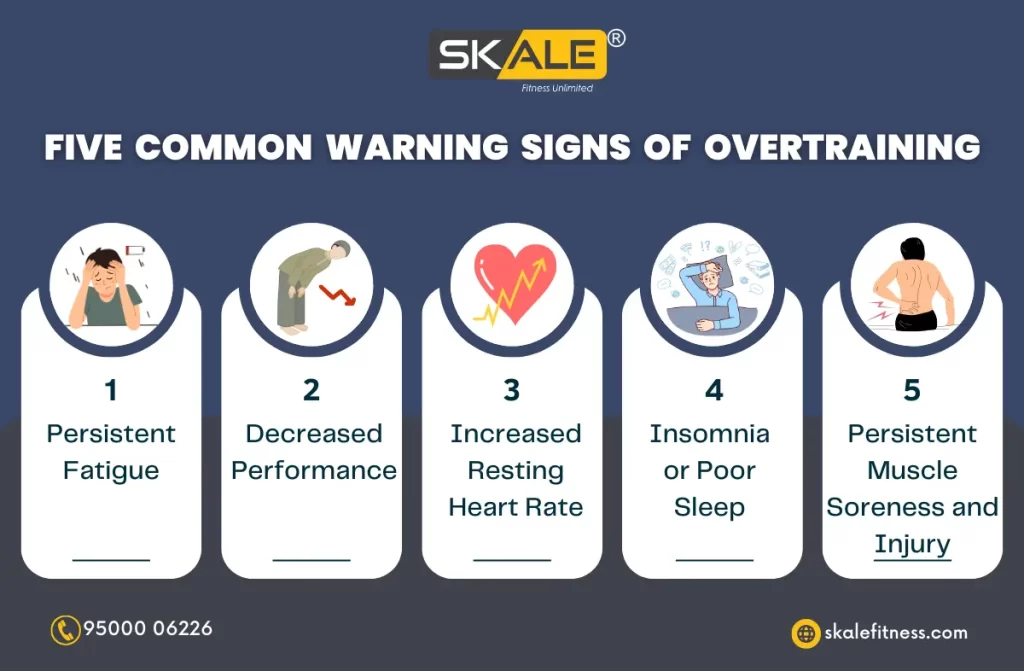In our relentless pursuit of fitness, we often walk a fine line between pushing our limits and pushing our bodies over the edge. The desire to achieve our fitness goals can sometimes lead us to ignore the signs our bodies are desperately trying to send us. In this blog post, we’ll explore the symptoms of overtraining, a condition that can derail your fitness journey and jeopardize your overall health. It’s crucial to be aware of the warning signs, and this article will help you recognize them.
The Overtraining Epidemic: Recognizing the Symptoms
The fitness world has witnessed a remarkable surge in popularity, with an ever-growing number of individuals participating in regular physical activity. Nonetheless, this heightened enthusiasm has also given rise to an increase in cases of overtraining. Overtraining transpires when the equilibrium between exercise and recovery is disrupted, triggering a series of adverse health consequences. To avert overtraining, it’s imperative to be able to identify the symptoms of overtraining.

Physical Signs of Overtraining
- Persistent Fatigue: Feeling exhausted after a tough workout is normal, but if you find yourself constantly fatigued, even after a good night’s sleep, it might be a symptom of overtraining.
- Decreased Performance: Symptoms of overtraining can manifest as a noticeable decline in your athletic performance. This may be evident when you struggle to lift the weights that were once manageable or observe a decrease in your running times. If you find that your progress has stalled, it’s essential to consider overtraining as a potential underlying cause.
- Increased Injury Risk: Overworked muscles and joints are more susceptible to injury. If you’re experiencing a higher frequency of injuries, it could be due to overtraining.
- Persistent Muscle Soreness: Delayed onset muscle soreness (DOMS) is normal after a challenging workout, but overtraining can lead to persistent muscle soreness that lingers for days or weeks.
Emotional and Psychological Signs of Overtraining
- Irritability and Mood Swings: Overtraining can affect your mood, leading to irritability, mood swings, and even depression. This is often related to hormonal imbalances caused by overtraining.
- Sleep Disturbances: Poor sleep quality, insomnia, and restless nights can be symptoms of overtraining. Sleep is crucial for recovery, and an overworked body may struggle to find rest.
- Lack of Motivation: A sudden lack of motivation or enthusiasm for your workouts could be a sign of overtraining. If you once loved hitting the gym but now find it a chore, it’s time to consider the possibility of overtraining.
- Decreased Immunity: Overtraining can weaken your immune system, making you more susceptible to illnesses and infections. If you’re frequently getting sick, it might be due to an overworked body.
Behavioral Symptoms of Overtraining
- Excessive Training: Overtraining often involves pushing yourself to the limits with excessive training. If you’re spending hours in the gym every day and refusing to take rest days, you’re putting yourself at risk.
- Disregarding the need for recovery: Overtraining often manifests when one overlooks the importance of rest and recovery. Your body’s healing and growth heavily rely on dedicated recovery days. Consistently skipping these vital rest days could indicate you’re headed towards overtraining.
- Inadequate Nutrition: Proper nutrition is crucial for fuelling your body and aiding in recovery. If you’re not providing your body with the necessary nutrients, you’re more likely to experience the symptoms of overtraining.
- Obsession with Appearance: If your sole focus is on achieving a certain appearance or body weight, you may be more prone to overtraining. This obsession can lead to unhealthy behaviors and an increased risk of overtraining.
Preventing Overtraining and Finding Balance
Now that you’re aware of the symptoms of overtraining, it’s essential to understand how to prevent it and maintain a balanced approach to fitness. Here are some essential tips:
- Tune in to your body’s signals: If you notice ongoing fatigue, declining performance, or any of the listed symptoms, consider it a cue to dial down your training and emphasize recovery.
- Plan Rest Days: Incorporate rest days into your training schedule. These days are not a sign of weakness but a crucial component of progress. Use them to recharge and let your body recover.
- Diversify Your Workouts: Avoid overworking specific muscle groups. Include a variety of exercises in your routine to give different muscle groups a chance to recover.
- Prioritize Nutrition: Proper nutrition is essential. Ensure you’re eating a balanced diet that provides the nutrients your body needs for recovery and growth.
How to recover from overtraining
To recover from overtraining, prioritize rest and active recovery. Take a break from intense workouts, focusing on light exercises like walking or yoga. Ensure ample sleep for rejuvenation and support your body with proper nutrition, emphasizing whole foods and adequate hydration. Incorporate techniques like foam rolling, stretching, and massage to alleviate muscle soreness and aid recovery. Gradually reintroduce workouts, paying attention to your body’s signals, and allowing for sufficient rest days. Seek guidance from a healthcare professional or trainer for a balanced recovery plan tailored to your needs. Prioritize self-care to restore your body’s balance and prevent future overtraining.
Conclusion
Overtraining is a real and often underestimated risk in the world of fitness. Ignoring the symptoms of overtraining can lead to not only physical setbacks but also mental and emotional challenges. It’s essential to recognize these symptoms and take them seriously. Achieving your fitness goals should be a sustainable and enjoyable journey, not a race to the finish line.
Read Also: Best Exercises for Runners






